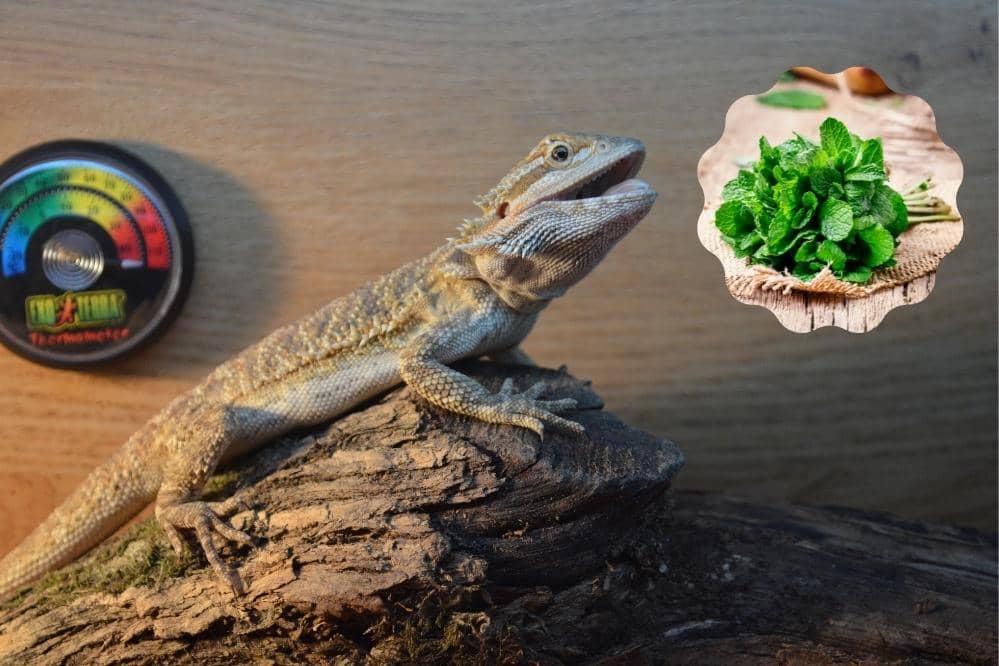Many people who have pet bearded dragons also have a garden where they grow vegetables and herbs. If mint is one of the things you grow, you may wonder if you can feed it to your lizard. Mint leaves have high water content and they don’t have any harmful substances in them, so you can feed them to your bearded dragon.
Is There Nutritional Value in Mint Leaves?
No matter what you are considering feeding your bearded dragon, the first thing you need to do is look at its nutritional value. If you let your bearded dragon fill up on snacks without a lot of nutritional content, they might not eat the foods they need to eat to thrive.
Mint leaves have high water content, which means that they don’t have a lot of nutritional value. However, you can feed them to your lizard. You should limit how much you feed and make it a special treat.
Benefits of Eating Mint Leaves for Bearded Dragons
Although there aren’t any nutritional benefits to feeding your bearded dragon mint leaves, there are some health benefits.
Mint is a soothing herb, and it is often eaten to help ease stomach aches. In addition, it tastes good. It has antioxidant and anti-inflammatory properties as well, due to its rosmarinic acid. It also contains traces of vitamin C, which is an important part of your bearded dragons diet. In fact, they can have problems if they have a vitamin C deficiency.
Risks of Feeding Mint Leaves to Your Bearded Dragon
There are a few risks when you feed your bearded dragon mint leaves, especially if you feed too much. Mint leaves are made up of around 85% water, so they can cause diarrhea in high quantities. They are also low in calcium. Your bearded dragon needs calcium, and mint only has traces. It is also important to look at the phosphorus levels because bearded dragons consume phosphorus and it attaches to the calcium and absorbs it.
Normally, you want to feed your bearded dragon food that is high in calcium compared to phosphorus; the ratio should be 2:1.
Another potential issue is that mint leaves can trigger GERD. GERD is gastroesophageal disease, and it can lead to heartburn. Another problem is that it contains peppermint oil, which can be toxic in high levels. Mint also contains the organic compound pure menthol, which can be poisonous in large amounts.
Can You Feed Juvenile Bearded Dragons Mint Leaves?
It is important to make sure that juvenile bearded dragons get the nutrients they need so that they can grow and develop in a healthy way. They need insects and plant-based ingredients that have the nutrients that are important, and you should avoid treats and snacks. For this reason, avoid mint leaves until they are adults.
How Should You Prepare Mint Leaves for Bearded Dragons?
If you want to feed mint leaves to your beardie, make sure that you treat them as an added treat. Mix them with other vegetables that are a regular part of their diets. You should never cook the mint leaves. You should chop them up into manageable bites. To determine the best size for food chunks, you should cut them to a size that equals the distance between their eyes. This helps to ensure that your lizard won’t choke on them.
You can feed your bearded dragon mint leaves on occasion. You should not do it regularly, and it should be a special treat every other week or once a month. It is important to focus on feeding your beardie foods that are high in nutritional value most of the time.
If you feed your bearded dragon too many foods that aren’t a part of its diet, it can become stressed. For this reason, save your mint leaves for special treats.
Final Words
Bearded dragons live on vegetables and insects, and they love treats. If you grow mint in your garden, you can give the leaves to your beardie for a special treat. They don’t offer any nutritional value, so be sure to limit how frequently you feed them this special treat. Your bearded dragon will enjoy the mint leaves as long as you don’t feed it too many in one sitting.

